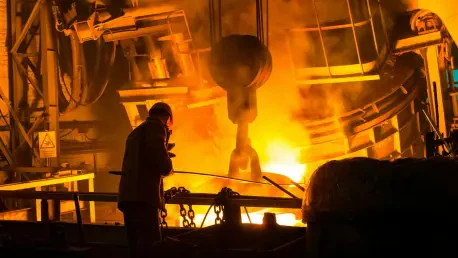In a transformative move for the steel industry, FalconPoint Partners has acquired SMS, a leading steel mill services and industrial decommissioning platform, in a $500 million carve-out from Scrap Metal Services. This deal, one of the most significant in the sector recently, signals a shift in how industrial services are positioned to meet growing demands in steel production. With global manufacturing reshoring and supply chain initiatives gaining momentum in the U.S. and Europe, the timing of this acquisition couldn’t be more critical. SMS, with its established reputation for excellence, and FalconPoint, with its strategic vision for growth, are poised to redefine standards in the industry. This partnership not only highlights the increasing role of private equity in industrial sectors but also raises questions about how such collaborations can drive innovation and sustainability. As the steel market evolves, the impact of this transaction promises to resonate across multiple facets of service delivery and operational efficiency.
Strategic Alignment in a Dynamic Market
The acquisition of SMS by FalconPoint Partners represents a calculated alignment of expertise and ambition within a rapidly changing steel industry. SMS, headquartered in Portage, Indiana, has built an impressive portfolio since its founding, operating over 20 facilities across the United States, Europe, and Mexico. Its divisions, SMS Mill Services and SMS Brownsville, cater to critical needs like material handling for steel producers and ship dismantling with environmental remediation. The company’s track record, including high-profile projects like the decommissioning of a major naval vessel involving tens of thousands of tons of material, underscores its capability. FalconPoint, a New York City-based private equity firm with a focus on mid-market industrial and business services, sees SMS as a platform for substantial growth. The firm’s leadership has emphasized the alignment of this deal with broader industry trends, particularly the push for enhanced manufacturing capabilities in key global regions.
Beyond the immediate operational synergies, this partnership is set to capitalize on the resurgence of steel production driven by reshoring initiatives. The global steel market is under pressure to adapt to supply chain restructuring, and SMS’s established presence positions it as a vital player in supporting steel mills during this transition. FalconPoint’s capital infusion and operational expertise are expected to amplify SMS’s ability to meet client needs, particularly in scaling services to match rising demand. Leadership from both entities has expressed confidence in maintaining SMS’s hallmark commitment to quality and safety while exploring new growth avenues. This strategic fit suggests a future where SMS could set benchmarks for efficiency and innovation in steel mill services. Moreover, the deal reflects a growing trend of private equity firms targeting specialized industrial platforms that can deliver consistent value in a competitive landscape, potentially inspiring similar investments across the sector.
Emphasis on Sustainability and Safety Standards
A defining aspect of the FalconPoint-SMS partnership is the shared commitment to sustainability and safety, priorities that are increasingly central to industrial operations. SMS has long prided itself on a flawless customer retention record, a testament to its rigorous standards in environmental services, scrap management, and raw materials processing. Its expertise in marine vessel decommissioning for both government and commercial clients further highlights a dedication to environmentally responsible practices. FalconPoint’s investment strategy explicitly values these attributes, with the firm’s leaders citing SMS’s leadership in sustainable operations as a key driver for the acquisition. This focus is particularly relevant as the steel industry faces scrutiny over its environmental footprint, pushing companies to adopt greener practices without compromising on operational efficiency or safety protocols.
This deal also underscores the broader industry shift toward integrating sustainability as a core business value rather than a secondary concern. With FalconPoint’s backing, SMS is well-positioned to invest in technologies and processes that further reduce environmental impact while maintaining high safety standards for workers and clients. The collaboration could lead to innovative approaches in slag management and site remediation, areas where SMS already excels. As regulatory pressures mount and stakeholders demand greater accountability, the emphasis on these principles could differentiate SMS from competitors, potentially setting a new standard for the sector. Additionally, the financial and advisory support from FalconPoint, facilitated by expert teams on both sides of the transaction, ensures that these priorities are not just aspirational but actionable, paving the way for SMS to influence industry norms over the coming years in a meaningful and measurable way.
Future Pathways for Industry Transformation
Reflecting on the $500 million acquisition, it’s evident that FalconPoint Partners and SMS crafted a partnership that responded adeptly to the evolving demands of the steel industry. The transaction, finalized with meticulous strategic planning, demonstrated how targeted investments could elevate specialized service providers to new heights. The synergy between SMS’s operational excellence and FalconPoint’s growth-oriented vision set a precedent for how industrial platforms could thrive amid market shifts. Looking back, the deal stood as a marker of how private equity could harmonize with industrial expertise to address critical needs in steel production.
Moving forward, the focus should be on leveraging this partnership to pioneer advancements in service delivery and environmental stewardship. Stakeholders in the steel sector might consider how similar collaborations could address gaps in infrastructure or technology adoption. Exploring scalable solutions for sustainability challenges, alongside maintaining rigorous safety protocols, remains a priority. The industry could benefit from studying this model to inspire investments that balance profitability with responsibility, ensuring that future growth aligns with global expectations for a more sustainable industrial landscape.









